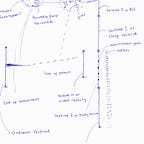Labor Economics: Global Library Innovation | Future of Work | Education
Public libraries can pivot towards organized serendipity — with benefit to new knowledge, skill acquisition, cognitive engagement, change of work, innovation and problem solving — by dividing shelves, for users, per interval.
This means that library members are assigned shelves and catalogues per week, month or quarter, where they have to flip through every material.
Whatever a user finds fascinating is expected to be noted for submission at the end of that interval. The purpose is to excavate hidden values in the countless amounts of printed and digital materials in a world where answers are sought to problems and new skills are required in a future of education for a new future of work.
Submitted notes would be published or archived.
It is common that some people randomly pick books in libraries and leads to finding something new and exploring further.
However, organizing serendipity gives that opportunity and better without the burden of rote, understanding or recall, with lots more materials in a short time.
There could be some form of incentives for users, but will mostly be for enthusiasts first, before permeation to others.
This will be possible by new library management software, for varying library arrangements, including for user participation policies.
University libraries can have students in classes, for this, per semester. There could also be local libraries in places where there was work, but a new workforce development is pursued, as part of their labor economics shift, to use this for knowledge exploration.
Subscribe to DDIntel Here.
Join our network here: https://datadriveninvestor.com/collaborate
